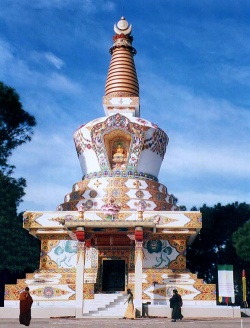Mahayana Mahaparinirvana Sutra: Chapter 11: On the Four Inversions
Mahayana Mahaparinirvana Sutra
Chapter 11: On the Four Inversions
Translated by Kosho Yamamoto from Dharmakshema's Chinese version,
edited and revised by Dr. Tony Page
Copyright for this edition is held by Dr. Tony Page, 2012.
“The Buddha said to Kasyapa: "We speak of the "four inversions". "Inversion" is spoken of when we entertain the idea of suffering where there is no suffering. "Non-suffering" is the Tathagata. The idea of suffering arises when a person thinks that all Tathagatas are non-eternal and that they change. If a person says that the Tathagata changes, this is (the concept of) suffering and constitutes a great sin. If a person says that the Tathagata relinquishes this body of suffering and enters Nirvana, and that this is like fuel being all burned up, as a result of which the fire dies out, this is having the idea of suffering vis-ã-vis non-suffering. This is an inversion (of the truth). A person might say: "Saying that the Tathagata is Eternal is a Self-centred view. From this Self-centred view arise innumerable sins. Thus, one should say that the Tathagata is non-Eternal, and by (saying) this I shall gain Bliss." The Tathagata's being non-Eternal would entail suffering. If (there is) suffering, how could one expect (to find) Bliss therein? When the idea of Bliss occurs (in such a connection), we say "inversion". This is said because the thought of suffering arises in (what truly is) Bliss. Bliss is the Tathagata. Suffering is the non-Eternal of the Tathagata. If a person says that the Tathagata is non-Eternal, this is a thought of suffering in Bliss. The Tathagata's being Eternal is Bliss. If I say that the Tathagata is Eternal, how can I enter Nirvana? If I say that the Tathagata is non-suffering, how could I cast away my body and enter Nirvana? When a person has the thought of suffering in Bliss, we say that this is an inversion. This is the first inversion.
"The idea of the Eternal vis-ã-vis the non-Eternal, and the idea of the non-Eternal vis-ã-vis the Eternal, are inversions. The non-Eternal is the non-practising of the Void. When one does not practise the Void, life is shortened. If one says: "Not practising the Void and quietude, one attains eternal life", this is an inversion. This is the second inversion.
"The thought of Self regarding non-Self, and the thought of non-Self regarding Self, are inversions. The people of the world say that there is Self, and within Buddhism, too, we say that there is Self. The people of the world say that there is Self, but there is no Buddha-Nature. This is having the idea of Self in (what is) non-Self. This is an inversion. “The Self spoken of in Buddhism is the Buddha-Nature.” The people of the world say that there is no Self in Buddhism. This is the idea of the non-Self in the Self. "It is definite that there is no Self in the Buddhist teaching. That is why the Tathagata tells his disciples to practise selflessness." If such is said, this is an inversion. This is the third inversion.
"The non-Pure in the Pure, and the Pure in the non-Pure, are inversions. The Pure relates to the Eternal of the Tathagata. It is not a food-supported body, not a body of illusion. It is not a carnal body, not a body made up of sinews and bones. If one says that the Tathagata is non-Eternal, a food-supported body, bound together by sinews and bones, and that Dharma, Sangha, and emancipation die out, this is an inversion. We say that the idea of the non-Pure in the Pure is an inversion. A person might say that there is not a whit of what is non-Pure in his mind, that as there is not a single thing that is not Pure, he gets into a place which is Pure, and that as the person practises the meditation of the non-Pure which the Tathagata spoke about, whatever was said above must be false. If a person speaks thus, this is an inversion. This is the fourth inversion."
Bodhisattva Kasyapa said to the Buddha: "O World-Honoured One! I have now for the first time gained the right view. O World-Honoured One! Until now, all of us were those who abided in wrong thought."
Continue Reading
- Mahayana Mahaparinirvana Sutra: Chapter 1: Introductory
- Mahayana Mahaparinirvana Sutra: Chapter 2: On Cunda
- Mahayana Mahaparinirvana Sutra: Chapter 3: On Grief
- Mahayana Mahaparinirvana Sutra: Chapter 4: On Long Life
- Mahayana Mahaparinirvana Sutra: Chapter 5: On the Adamantine Body
- Mahayana Mahaparinirvana Sutra: Chapter 6: On the Virtue of the Name
- Mahayana Mahaparinirvana Sutra: Chapter 7: On the Four Aspects
- Mahayana Mahaparinirvana Sutra: Chapter 8: On the Four Dependables
- Mahayana Mahaparinirvana Sutra: Chapter 9: On Wrong and Right
- Mahayana Mahaparinirvana Sutra: Chapter 10: On the Four Truths
- Mahayana Mahaparinirvana Sutra: Chapter 11: On the Four Inversions
- Mahayana Mahaparinirvana Sutra: Chapter 12: On the Tathagata-DHATU
- Mahayana Mahaparinirvana Sutra: Chapter 13: On Letters
- Mahayana Mahaparinirvana Sutra: Chapter 14: On the Parable of the Birds
- Mahayana Mahaparinirvana Sutra: Chapter 15: On the Parable of the Moon
- Mahayana Mahaparinirvana Sutra: Chapter 16: On the Bodhisattva
- Mahayana Mahaparinirvana Sutra: Chapter 17: On the Questions Raised by the Crowd
- Mahayana Mahaparinirvana Sutra: Chapter 18: On Actual Illness
- Mahayana Mahaparinirvana Sutra: Chapter 19: On Holy Actions
- Mahayana Mahaparinirvana Sutra: Chapter 20: On Pure Actions
- Mahayana Mahaparinirvana Sutra: Chapter 21: On the Action of the Child
- Mahayana Mahaparinirvana Sutra: Chapter 22: Bodhisattva Highly-Virtuous King
- Mahayana Mahaparinirvana Sutra: Chapter 23: On Bodhisattva Lion's Roar
- Mahayana Mahaparinirvana Sutra: Chapter 24: On Bodhisattva Kasyapa
- Mahayana Mahaparinirvana Sutra: Chapter 25: On Kaundinya



